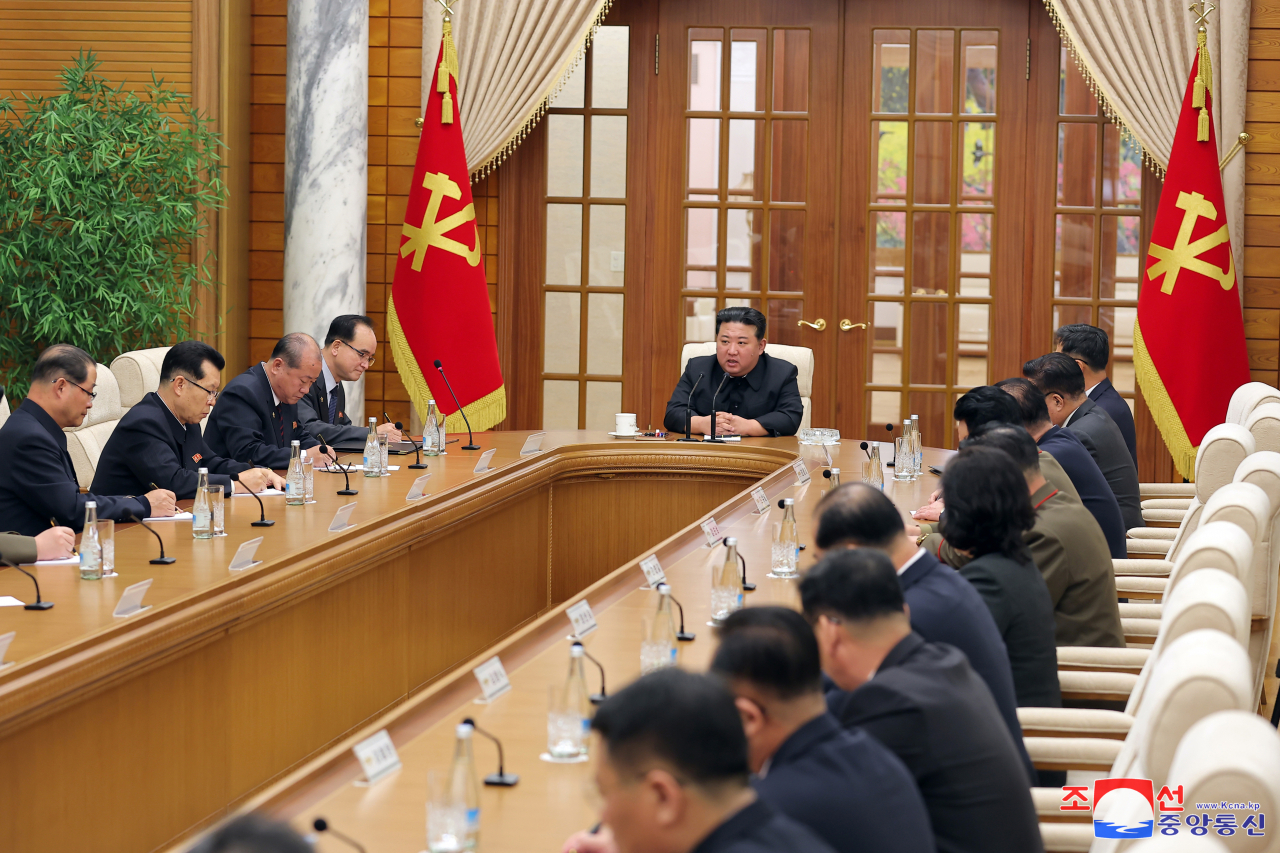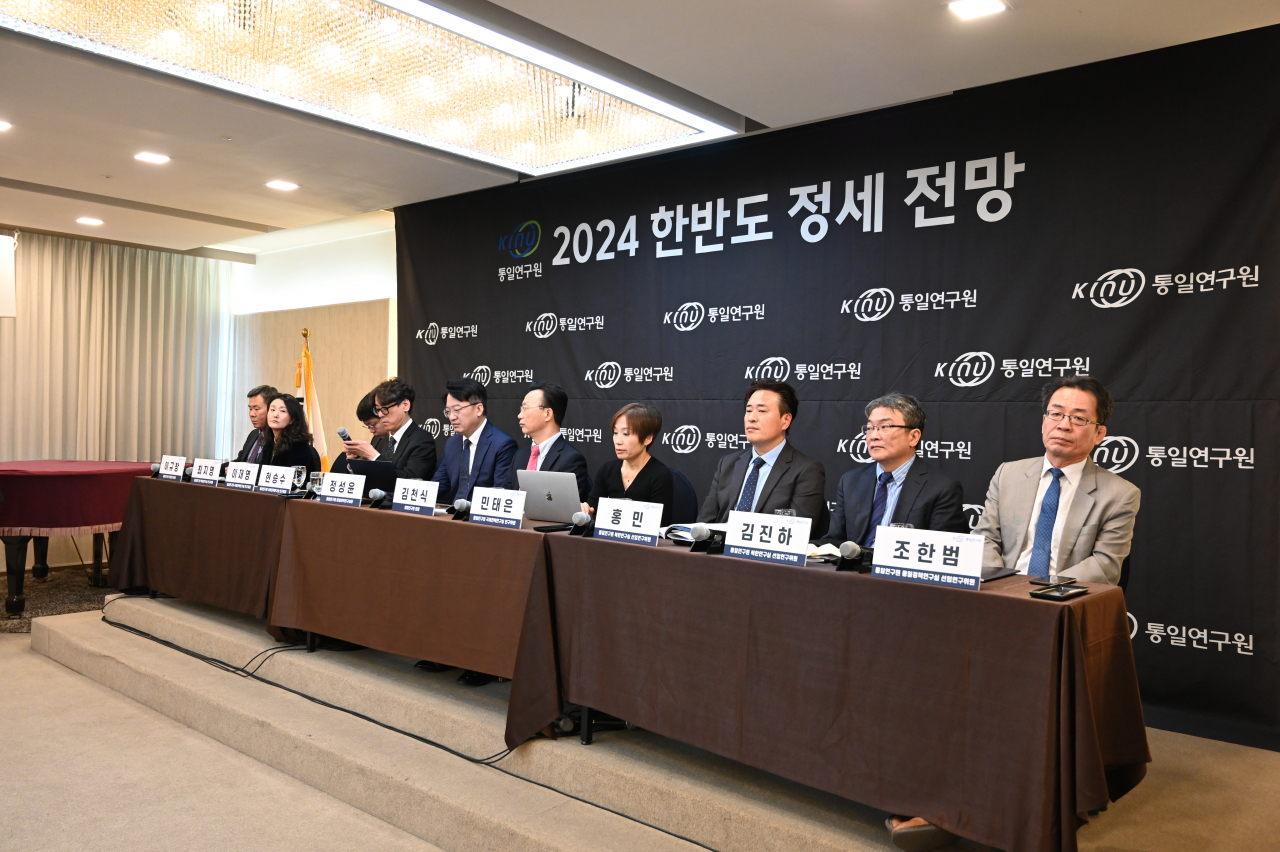NK may use provocations to impact S. Korea, US elections: report
By Ji Da-gyumPublished : Dec. 13, 2023 - 15:48

North Korea may resort to military provocations and psychological warfare, and escalate tensions to influence crucial elections in South Korea and the United States next year, the government-funded Korea Institute for National Unification said Wednesday in an annual report.
The elections will be crucial factors in shaping North Korea's foreign policy approach and strategic decisions in the coming year, experts at the KINU said during a briefing on the forecast of the security landscape on the Korean Peninsula for 2024.
The year 2024 is set to witness significant electoral events, with presidential elections in Taiwan scheduled for January, Russia in March, and the United States in November. Additionally, South Korea will hold a general legislative election in April to elect 300 lawmakers who will serve in the National Assembly for the next four years.
"There is a possibility that North Korea may heighten tensions on the Korean Peninsula by adopting a more adventurous diplomatic approach and engaging in military provocations specifically targeting major elections within the liberal bloc," said Kim Jin-ha, a KINU senior research fellow.
"The unfolding dynamics of confrontations between the US and Russia, as well as the US and China, will play a decisive role in shaping the behavior and intensity of provocations initiated by North Korea."
Kim also underscored that South Korea particularly "should prepare for what could be characterized as North Korean-style hybrid warfare" that employs a combination of online and offline tactics.
There is the potential for Pyongyang to orchestrate political and psychological warfare, encompassing large-scale cyberattacks, to seek to sow division in public opinion and exert influence on South Korea's internal politics, according to Kim.
North Korea might "take actions aimed at influencing the election landscape by drawing attention to what it perceives as South Korea's failure in its North Korea policy in the lead-up to the general elections," said Hong Min, a KINU senior research fellow.
Hong suggested that North Korea, rather than resorting to conventional military provocations, may prefer to escalate tensions by demonstrating actions that signal the nullification of the Sept. 19 inter-Korean military agreement. This could involve an increase in military activities across land, air, and sea.
"There is the possibility that North Korea might place emphasis on showcasing advancements in its nuclear and missile capabilities. Simultaneously, it may strongly convey the perceived improbability of denuclearization and the irreversible nature of its nuclear armaments to the next US administration," Hong said.
"The strategic move could coincide with an escalation in the anti-US rhetoric and campaign, particularly targeting the US presidential election."

Chung Sung-yoon, director of the Unification Policy Research Division, projected that North Korea would uphold its foundational position of bolstering nuclear capabilities and engaging in disarmament negotiations with the US on an equal footing, rather than pursuing denuclearization negotiations.
The Kim Jong-un regime has maintained the belief that the US, irrespective of political factions such as Democrats and Republicans, consistently pressures concessions on denuclearization solely from a position of strength.
"If North Korea deems its nuclear capabilities insufficient (for disarmament negotiations), it is unlikely to be fixated on dialogue with the US even if Trump returns to power," Chung said, adding North Korea's closer alignment with China and Russia has diminished the country's need to sit down with the US.
Despite experts' doubts about the long-term sustainability of a trilateral alignment among Beijing, Moscow and Pyongyang in light of different strategic interests, next year could see a closer alignment in the political sphere.
The highly likely reelection of Russian President Vladimir Putin in the March 2024 election, which would keep him in office in the Kremlin until 2036, is expected to create an environment conducive to stronger ties between North Korea and Russia, said Hyun Seung-soo, a KINU research fellow.
"In 2024, there is an anticipation of more active political exchanges between Russia and North Korea. The possibility of President Putin visiting Pyongyang for a summit to enhance the visibility of solidarity between the two countries cannot be ruled out," Hyun said.
"It is also expected that multifaceted cooperation will be pursued in the economic and social domains. ... However, given the sanctions imposed on both Russia and North Korea, it is predicted that the pace and scale of such cooperation may not be significant."
Next year is also the 75th anniversary of the establishment of diplomatic relations between China and North Korea, as well as between China and Russia.
"In the field of diplomacy, China is therefore anticipated to actively pursue multipolarization and opposes bloc confrontation through solidarity with Russia and North Korea," said Lee Jae-young, a KINU research fellow.
But Lee said trilateral military exercises are realistically challenging, and the outlook for trilateral economic cooperation is limited.
"North Korea's economic cooperation with China and Russia is likely to concentrate on evading sanctions and attempting to neutralize their impact," Lee said, noting that the primary form of this cooperation would be the economic support provided by China and Russia to North Korea.




















